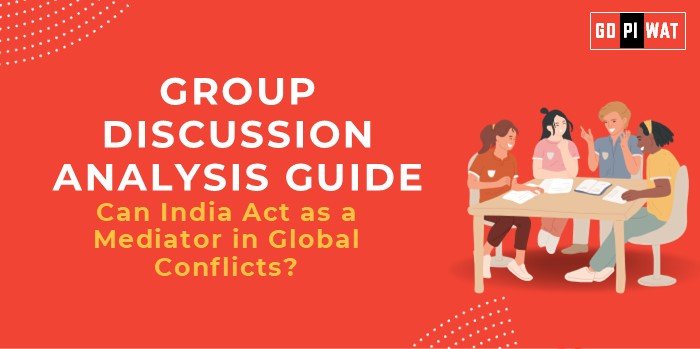📋 Group Discussion Analysis Guide
🌟 Can India Act as a Mediator in Global Conflicts?
🌐 Introduction to the Topic
Opening Context: With rising geopolitical tensions and polarizations in the international arena, India’s historical position as a proponent of non-alignment and its growing global influence make it a compelling candidate for mediation roles in global conflicts.
Topic Background: India has a legacy rooted in peace advocacy, from Mahatma Gandhi’s principles of non-violence to its role in establishing the Non-Aligned Movement (NAM). In recent decades, India’s strategic partnerships and global stature have positioned it as a potential mediator in resolving complex international disputes.
📊 Quick Facts and Key Statistics
- 🌍 India’s Trade Reach: Engages in trade relations with over 190 countries, showcasing its interconnectedness.
- 🕊️ UN Peacekeeping Missions: Second-largest troop contributor to UN peacekeeping forces.
- ⚖️ Geopolitical Neutrality: Despite being a Quad member, India maintains strong ties with Russia and Iran.
- 💰 Global Economic Rank: Fifth largest economy globally, highlighting its influence.
🤝 Stakeholders and Their Roles
- 🏛️ Government of India: Drives foreign policy to balance relations with major powers.
- 🌏 Neighboring Countries: Rely on India’s goodwill in regional disputes (e.g., India-Nepal border discussions).
- 🌐 International Organizations: Leverage India’s participation, such as the UN or BRICS.
- 🔗 Global Powers: India’s unique positioning allows dialogue with multiple power blocs.
📋 Achievements and Challenges
- 🏅 Achievements:
- Neutral stance, such as India’s abstention in UN votes regarding Ukraine.
- Bilateral dialogues, including successful mediation in Maldives’ political crisis (2018).
- Cultural diplomacy through initiatives like International Yoga Day to promote peace.
- ⚠️ Challenges:
- Perceived bias in South Asia, such as India-Pakistan and India-China tensions.
- Global trust deficit due to India’s stance on Russia.
- Limited diplomatic leverage compared to established mediators like the US or EU.
- 🌍 Global Comparisons:
- ✅ Success: Norway in the Israel-Palestine Oslo Accords.
- ❌ Challenges: Turkey’s strained neutrality in NATO.
- 📚 Case Studies:
- Sri Lanka’s Civil War Mediation: India’s involvement faced both praise and criticism for outcomes.
- Afghanistan Stability Efforts: Investments post-US withdrawal.
📚 Structured Arguments for Discussion
- 👍 Supporting Stance: “India’s geopolitical neutrality and growing global influence uniquely qualify it to mediate complex conflicts, especially in the Global South.”
- 👎 Opposing Stance: “India’s regional conflicts and domestic challenges undermine its credibility as an impartial mediator on the global stage.”
- ⚖️ Balanced Perspective: “India’s potential as a mediator is significant but requires further strengthening of trust and neutrality in its international relations.”
✅ Effective Discussion Approaches
- Opening Approaches:
- “India’s unique position as a Quad member and BRICS leader showcases its capability to mediate between the East and West.”
- “India’s contribution to UN peacekeeping highlights its commitment to global peace.”
- Counter-Argument Handling:
- Emphasize historical successes in mediation.
- Highlight its balanced foreign policy as a strength.
📊 Strategic Analysis of Strengths and Weaknesses
- 💪 Strengths:
- Geopolitical neutrality.
- Influence in the Global South.
- ⚡ Weaknesses:
- Regional biases and unresolved conflicts.
- 🚀 Opportunities:
- Mediation in non-traditional security issues like climate change.
- 🌐 Threats:
- Domestic political instability affecting international credibility.
🌍 Connecting with B-School Applications
- 📈 Real-World Applications: Insights into India’s mediation strategies can be integrated into leadership, negotiation, and geopolitics-focused projects.
- 💬 Sample Interview Questions:
- “Can India’s diplomatic initiatives redefine global conflict resolution?”
- “What lessons from India’s foreign policy can be applied to business negotiations?”
- 💡 Insights for B-School Students:
- Understanding geopolitical strategy enhances global business acumen.
- Collaborative models from international mediation can be applied to team management.


